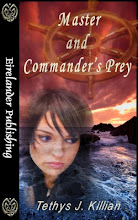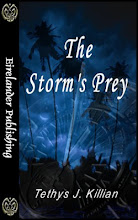I get this a lot as a publisher as well as an editor, 'but my crit partner says this' or 'I belong to X Y and Z crit groups'. Normally, I'm thinking – very good for your crit partners and what's their experience in the industry?
This might not seem like a big issue but there is a hardcore fact in the industry, mentors are hard to come by. Crit partners, like crit groups, are a dime a dozen. The funny thing about the latter is as a writer you have to recognize your strengths and nail out a list of your weaknesses. If you don't know what is wrong with your story, how can you expect any crit partner to knock out a stellar edit? How will you recognize if they are right or wrong?
Voice plays into this. As an editor, I know of authors who are gangbuster brilliant in the Omniscient Voice. They head hop like there is no tomorrow and the opposing thoughts of the hero or heroine literally hold me captive in the story. Currently most crit partners only recognize head hopping as a no-no. They should be able to point out sloppiness, or say because the opposing perceptions occur without rhyme or reason or read as ESP this mucks up the story. It is much the same in first person POV. I and I and I, My and My and My – too much passivity in a first person story can drag the steam right out of the plot. Crit partners, good ones at least, should be able to point this out.
A crit partner or a crit group shouldn't try to rewrite your story to prove they know it all or to make the story more their style. I once met a writer who was told her story would never sell because there wasn't enough romance in it. After massive rewrites and a lot of frustration, this author was very nearly ready to give up until she met me. I was able to point out where her crit partners had gone off the reservation. First, recognize what genre you are writing in. In the case of this author, she was writing Women's Fiction, not Romance. Women's fiction is a General Fiction sub-genre. Romance is romance. These two often cross paths but a Woman's Fiction story is greatly known as the heroine's journey. If a romance is added, the focus is still on the heroine's personal evolution. She may end up with an HEA, but that doesn't mean it is a necessity of this sub-genre. A crit group or partner should never say a story is unsellable simply because they don't agree or can't see what a writer is writing.
Have open discussions with your crit partners or groups. Ask them what they think is the issues you might encounter in their story. You too should tell them where you think you went off the track. If you recognize your voice is a tad bit sloppy, then ask a crit partner to look at that alone, especially if you are in the first few tries at a different voice. If you think you've delved too far into back story, ask them if they think it is too much or not enough. Never pay attention to the hard and fast rules about this one specific rule. You need to set up your story so the reader can root for the character. Don't delude yourself that just because an author is multi-published or with an agent that they know it all. I guarantee you, they don't. If you have a particular group of crit partners say five or so, you should have at least one who recognizes plot and characterization flaws and one who is a grammar queen.
A crit group is not a cheerleading squad. You should expect to work just as hard with a crit partner or group as you do with an editor. They should make you think. They should give you constructive advice and let you know where your story has gone awry. This should never include flaming or author bashing. Yes, you have to be open to the criticism, but you should never hear the words – 'you don't know what you are doing' or 'I've never read a worst story'. You may not know what you are doing, but bashes like the ones I pointed out aren't helpful. There is one author in particular out there who does this and I am the first person to tell her to check her ego and her hate at the door. In my thirty years of experience, I've only ever found one story I would consider beyond redemption. Even then I debated because I knew what the author was trying to do, she simply dug in her heels on the principle of what she wanted to portray.
Trust is the pinnacle point of any crit group. The moment the trust is broken the relationship is over. If you are in a crit group and start to see a variation of your story come into play, it is a bad situation. That isn't to say there isn't some carryover in this industry. Of course there is. The fact is crit partners shouldn't be taking advantage of the story you are working on. They shouldn't ever say to you, 'I liked your concept so much I decided to use it' or if you hear, 'I've used this specific plot device because I read it in another book', get out. The former is breaking professional courtesy, the latter is plagiarism.
Now it's your turn. Do you think crit partner/s or groups are really meeting the mark or are they letting you down? Do you walk away from each crit feeling like your writing is better and still your own words?
Until next time, cheers and happy writing,
T.J.





.jpg)
.jpg)






5 comments:
Loved your blog. It definitely gives me something to think about regarding my current critique groups and how we can be more effective. It also reminds me to ask my group, for the type of feedback I'm looking for, as well as ask them what type of feedback they want or need from me. Great reminders, thanks.
Great blog post, T.J.
I think critique groups are only as good as the knowledge they have about writing. My first critique group were all beginning writers, and some of us stayed together for ten years. We learned a lot from each other, but there comes a time when you just have to move on. It's hard to do because you become very comfortable with one another.
This group didn't hurt each other, but we didn't learn enough from one another. Some of the writers advanced faster than others, some moved on and others just quit.
What I think hurt us the most was the one or two published authors who were adamant in their opinions. With these people there's only one way or the high way.
Contests were another hazard because some of those judges were not at all helpful, and just loved to rewrite your story for you.
T.J., I'm sure that if I hadn't met you that I would never have been published. I consider myself blessed to have found you and your sisters, and that you were willing to take the time to help me to learn this difficult craft.
Thanks a million.
I think the whole critique group thing can be complicated. I've gotten to the point where I can find mine very useful because I sort of decide what I agree with and what I don't.
In the beginning, when I was first writing, I changed every small thing people told me. Now, I know better.
This knowledge came when I did sell a work of mine and the editor had me changing things back to how I had originally written them.
But there is a lot of help available from my critique group that is beneficial and I'm grateful to have it.
I do love having my critique partner, she pays close attention to my work, follows it from start to finish, and tells me when its not my best work or best voice.
This was a very helpful blog, TJ, and helped me. Thanks
Wow, many points to think about. Foolishly, I never gave much thought to the plagiarism thing. So now I have that to freak out over. But I like what Rebecca added about changing every little thing at first. I did that too. Especially shooting for the erotic market. I get a lot of 'not hot enough', 'way too naughty', 'need more sex', 'need more story, less sex'. My stories were a colorful delete/add nightmare. I've settled down and decided that, until it's in the hands of an editor, the choice is mine. Great helpful post.
Gem
Very informative. I am thankful to have found a couple CPs from whom I can expect honesty AND encouragement and after working together for a while know each others' weaknesses adn strengths.
I have had an issue with possible plagiarism. I say possible because we sometimes think we're the first ones to use a certain phrase when, in fact, it's probably come from our subconscious through our reading. But when a writer remarks that the phrase is killer... and then uses it in the same context, it's difficult to regain that trust.
Protecting the work, both your own and the other author's is an important part of the CP relationship.
Great thoughts to discuss with critique partners, TJ, especially coming from an editor.
Thanks!
Marley
Post a Comment